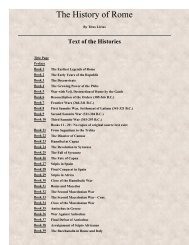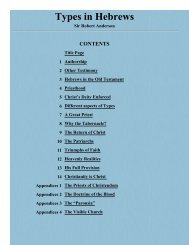The Person of the Holy Spirit - Table of Contents
The Person of the Holy Spirit - Table of Contents
The Person of the Holy Spirit - Table of Contents
You also want an ePaper? Increase the reach of your titles
YUMPU automatically turns print PDFs into web optimized ePapers that Google loves.
<strong>Spirit</strong> is operative in <strong>the</strong> Old Testament, and <strong>the</strong> procession was <strong>the</strong>n a fact (Ps 104:30). <strong>The</strong> work <strong>of</strong> <strong>the</strong> <strong>Holy</strong> <strong>Spirit</strong> in<br />
creation and all subsequent operations involves <strong>the</strong> procession <strong>of</strong> <strong>the</strong> <strong>Spirit</strong>.<br />
<strong>The</strong> very nature <strong>of</strong> procession points to its eternity. Procession like <strong>the</strong> eternal generation <strong>of</strong> Christ is not a matter <strong>of</strong><br />
creation, commencement <strong>of</strong> existence, or analogous in any way with physical relationships common in <strong>the</strong> human realm. It<br />
proceeds ra<strong>the</strong>r from <strong>the</strong> very nature <strong>of</strong> <strong>the</strong> Godhead, being necessary to its existence. Without <strong>the</strong> <strong>Holy</strong> <strong>Spirit</strong>, <strong>the</strong> Godhead<br />
would not be what it is. <strong>The</strong> procession <strong>of</strong> <strong>the</strong> <strong>Holy</strong> <strong>Spirit</strong> cannot be compared to <strong>the</strong> incarnation, as <strong>the</strong> incarnation was not<br />
essential to deity, though it is essential to its manifestation, especially <strong>the</strong> attributes <strong>of</strong> love and righteousness as <strong>the</strong>y<br />
combine in grace.<br />
3. <strong>The</strong> Relation <strong>of</strong> Procession and Generation.<br />
<strong>The</strong>ologians have borrowed <strong>the</strong> Scriptural distinctions as to <strong>the</strong> eternal relation <strong>of</strong> <strong>the</strong> Second and Third <strong>Person</strong>s to <strong>the</strong> First<br />
<strong>Person</strong>. In speaking <strong>of</strong> <strong>the</strong> Son, <strong>the</strong> Scriptures affirm His generation eternally (Ps 2:7), while in speaking <strong>of</strong> <strong>the</strong> <strong>Spirit</strong>, <strong>the</strong><br />
word proceed is used, as we have seen. No human mind can improve on <strong>the</strong>se distinctions, even if it be admitted that <strong>the</strong><br />
terms are inadequate to comprehend all <strong>the</strong> truth which <strong>the</strong>y represent. Generation must be guarded from all purely<br />
anthropomorphic ideas, and proceeding must be made eternal. <strong>The</strong> terms cannot be reversed. Though Christ may be said to<br />
have proceeded from <strong>the</strong> Fa<strong>the</strong>r, it cannot be said <strong>of</strong> <strong>the</strong> <strong>Spirit</strong> that He is generated.<br />
4. <strong>The</strong> Relation <strong>of</strong> Procession to <strong>the</strong> Work <strong>of</strong> <strong>the</strong> <strong>Holy</strong> <strong>Spirit</strong>.<br />
In <strong>the</strong> case <strong>of</strong> Christ, His eternal generation involved <strong>the</strong> work <strong>of</strong> <strong>the</strong> Son which was accomplished in time, fulfilling <strong>the</strong><br />
covenant <strong>of</strong> redemption. On <strong>the</strong> part <strong>of</strong> <strong>the</strong> <strong>Holy</strong> <strong>Spirit</strong>, <strong>the</strong> eternal procession <strong>of</strong> <strong>the</strong> <strong>Spirit</strong> issued in <strong>the</strong> ministry which<br />
ensued. As Christ became an obedient Son in doing <strong>the</strong> Fa<strong>the</strong>r’s will, so <strong>the</strong> <strong>Holy</strong> <strong>Spirit</strong> in procession became obedient to<br />
<strong>the</strong> Fa<strong>the</strong>r and <strong>the</strong> Son. This subordination without detracting from <strong>the</strong> eternal glory and divine attributes which<br />
characterized all three <strong>Person</strong>s is illustrated abundantly in <strong>the</strong> Scriptures (John 14:16, 26; 15:26; 16:7). <strong>The</strong> ministry <strong>of</strong> <strong>the</strong><br />
Third <strong>Person</strong> is accomplished in His own power and gives testimony to His eternal deity and glory, but it is accomplished on<br />
behalf <strong>of</strong> <strong>the</strong> Fa<strong>the</strong>r and <strong>the</strong> Son. Hence, we find <strong>the</strong> <strong>Spirit</strong> being sent into <strong>the</strong> world to reveal truth on behalf <strong>of</strong> Christ (John<br />
16:13-15), with <strong>the</strong> special mission <strong>of</strong> making <strong>the</strong> things <strong>of</strong> Christ known and magnifying <strong>the</strong> Fa<strong>the</strong>r and <strong>the</strong> Son. He is not<br />
seeking His own glory any more than <strong>the</strong> Son sought His own glory while in <strong>the</strong> period <strong>of</strong> humiliation.<br />
We may see, <strong>the</strong>n, in <strong>the</strong> work <strong>of</strong> both <strong>the</strong> Son and <strong>the</strong> <strong>Spirit</strong>, an illustration <strong>of</strong> <strong>the</strong> respective doctrines <strong>of</strong> eternal generation<br />
and procession. While <strong>the</strong> Fa<strong>the</strong>r sends <strong>the</strong> Son and <strong>the</strong> <strong>Spirit</strong>, <strong>the</strong> Son never sends <strong>the</strong> Fa<strong>the</strong>r, but does send <strong>the</strong> <strong>Spirit</strong>. <strong>The</strong><br />
<strong>Spirit</strong> nei<strong>the</strong>r sends <strong>the</strong> Fa<strong>the</strong>r nor <strong>the</strong> Son, but is subordinate to <strong>The</strong>ir will which at all times is His own will, and<br />
accomplishes His work in <strong>the</strong> earth. While <strong>the</strong> nature <strong>of</strong> procession is largely inscrutable, it is an expression in human words<br />
based on <strong>the</strong> Scriptural revelation <strong>of</strong> <strong>the</strong> relationship <strong>of</strong> <strong>the</strong> <strong>Person</strong>s <strong>of</strong> <strong>the</strong> Trinity to each o<strong>the</strong>r.<br />
Introduction.<br />
IV. <strong>The</strong> Titles <strong>of</strong> <strong>the</strong> <strong>Holy</strong> <strong>Spirit</strong>.<br />
An examination <strong>of</strong> <strong>the</strong> Scriptural revelation on <strong>the</strong> <strong>Holy</strong> <strong>Spirit</strong> will indicate that He is nowhere given a formal name, such as<br />
we have for <strong>the</strong> Second <strong>Person</strong>, <strong>the</strong> Lord Jesus Christ, but is ra<strong>the</strong>r given descriptive titles, <strong>of</strong> which <strong>the</strong> most common in<br />
Scripture and in common usage is <strong>the</strong> <strong>Holy</strong> <strong>Spirit</strong>. As His <strong>Person</strong> is pure spirit, to which no material is essential, He is<br />
revealed in <strong>the</strong> Scriptures as <strong>the</strong> <strong>Spirit</strong>. <strong>The</strong> descriptive adjective holy is used to distinguish Him from o<strong>the</strong>r spirits, which<br />
are creatures.<br />
A study <strong>of</strong> <strong>the</strong> references to <strong>the</strong> <strong>Holy</strong> <strong>Spirit</strong> by various titles in Scripture will reveal some significant facts. <strong>The</strong> basic words<br />
in <strong>the</strong> original are also used in reference to entities o<strong>the</strong>r than <strong>the</strong> <strong>Holy</strong> <strong>Spirit</strong>. In <strong>the</strong> Old Testament, however, ••• is used








